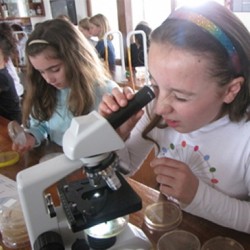 CSC researcher gives local students a taste of hands-on science
CSC researcher gives local students a taste of hands-on science
Trying to get to grips with the intangible world of cells and microbes can leave even the brightest young minds drowning in a sea of organelles. Seeing microbiology in action, however, can bring science to life in a way that a textbook never could. The children of one local school are learning that there is no substitute for getting your hands dirty and doing your own experiments.
Dr Selina Raguz (Cell Proliferation) has brought the laboratories of the CSC to the pupils of the Instituto Español Vicente Cañada Blanch on Portobello Road. As part of the school’s Science Week, she has been introducing the year 5 students, aged 10-11, to the wonderful world of microbiology. Across two sessions, the ‘chicos‘ devised and carried out experiments to reveal the microbes living on their hands and possessions. A week after inoculating Petri dishes of agar with fingerprints and swabs from surfaces from keyboards to shoe soles, the visible microbial growth provoked quite a reaction.
The shrieks and groans of disgust and delight masked a deep curiosity throughout the class. “I really liked it,” said one pupil. “It’s fun to figure out what microbes grow where, and it’s nice to find it out for yourself. You learn more this way, and it’s more fun. And I’ll definitely wash my hands more now.” The experiments acted as a springboard for learning about everything from filamentous fungi to E. coli. The session concluded with an introduction to microscopy, with the pupils zooming in on sections of skin cancer, blood cells, head lice, and wriggling C. elegans.
Selina, who is part of the Cell Proliferation Group, working on cellular senescence and it’s role as a tumour suppression mechanism, hoped to impart not just a lesson about cleanliness, but also a general enthusiasm for science. “I wanted the kids to learn the scientific method. I wanted to teach them to question everything: Don’t believe anything until you see it for yourself; when you read something, or see advertisements, you have to ask yourself “is this true?” That’s what scientists do, and I wanted them to ask their own, slightly more simple, questions. For example, ‘why do I need to wash my hands?’ It’s great to put the children in a situation that’s safe and controlled, and let them play, ask their own questions, and follow their own direction.”
With the success of this foray into a local school, Selina plans to expand the project in the future. “Hopefully I’ll visit other local schools, and we can continue build the links between the CSC and schools. When students are making pivotal decisions about subject choices, these kinds of experiences could be key.”
